
Album Art Courtesy of Secretly Canadian Records
This past week, Chicago-based indie-folk rock group Whitney released their second album, Forever Turned Around. The group is made up of former Unknown Mortal Orchestra drummer Julien Ehrlich and former Smith Westerns guitarist Max Kakacek. Whitney was created as an opportunity for the two to collaborate together.
While their new album provides listeners with the familiar feel-good iconic Whitney sound that many have become accustomed to, there are also signs of growth and stylistic experimentation signaling that the group has evolved.
Whitney is commonly known for their distinctive high-pitched harmonies, rhythmic guitar picking, use of the brass section and an overall sing-songy approach to their music. In their newest work, Ehrlich and Kakacek tend to stick to what they are known for, but also push and capitalize on their ability as musicians through the addition of jazz elements.
The 10 tracks on Forever Turned Around deal with the concept of the dangers of love in various ways.
The first track “Giving Up,” which was released as a preview single ahead of the album, reflects the theme of unrequited love. The somber lyrics make for a melancholy feel, yet the groove of the guitar and piano make it impossible to sit still.
This coinciding pattern of being both pensive and up-beat is a common trait in the band, and they maintain this tendency throughout the album.
Through other songs such as “Valleys (My Love)” and “My Life Alone,” main vocalist Ehrlich once again toys with the risks that come along with falling for another person. The lyrics in both songs suggest that Ehrlich longs to be with a lover who is no longer in the picture. He reminisces on the times spent together and addresses the struggles of being apart, longing for the warmth he once felt. Together with the simplistic lyrical content, Ehrlich utilizes his floating falsetto to send a heartfelt cry to the listener.
Although this album maintains the beloved Whitney sound that draws listeners, the duo isn’t afraid to experiment with their musical abilities. The two-minute instrumental track “Rhododendron” demonstrates this well as Ehrlich sits back and plays jazz-inspired drum grooves. Horn sections could easily be mistaken for arrangements on Sufjan Stevens’ album Come and Feel The Illinoise, an iconic midwestern ballad that takes root in Whitney’s neck of the woods. While short, the two-minute jam is a great distraction from the lyrical heaviness that is reflected throughout the album.
“Being both pensive and up-beat is a common trait in the band, and they maintain this tendency throughout the album.”
The use of the brass section in Whitney’s work is far from uncommon, yet the instrumental presents the soulful instruments in ways they have never been heard. Rather than being a backup instrument to help solidify a melody or harmony, the brass takes the lead. The chords played on the keyboard help to provide depth to overtake the indie approach that the group tends to lean towards.
The album’s title tracks wraps up the collection nicely. An undertone of folk-acoustic guitar helps to get the song going until Ehrlich and Kakacek dive into the chorus. The use of repetition on the phrase “Forever Turned Around” assists in tying the central idea of the work back in: confusion in terms of love. There is no turning back once the feeling hits, so the hazards of the emotion surround.
Forever Turned Around represents a Whitney duo that stays true to their old ways while still proving that they are more than just another indie band. Their distinct sound and questioning of love and the consequences separate them from the pack in the best way possible. Forever Turned Around is a strong addition to the group’s catalog.
Whitney will pay a visit to the area for a show at the Ogden Theatre in Denver on Oct. 21. Tickets are on sale now.
Contact CU Independent Staff Writer Benny Titelbaum at benny.titelbaum@colorado.edu
